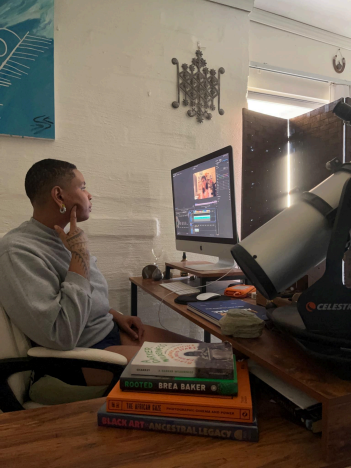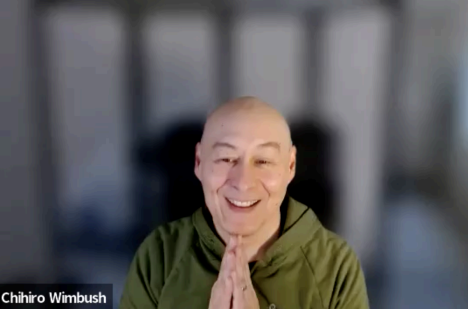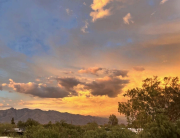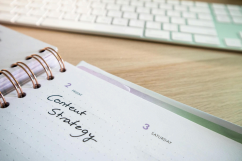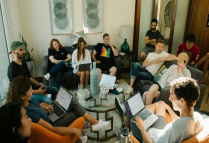There’s this moment that happens right before I hit record. A flutter in my stomach, that quick breath, and then—connection. My guest and I lock eyes (even if it’s through a screen), and we jump into the conversation like we’re diving into cool water on a hot day.
Arts2Work CONVERSATIONS has been equal parts exhausting and exhilarating. For those who haven’t tuned in yet, the podcast is where I get to talk with incredible creators who are reshaping how we think about media, art, and community. But here’s the thing—it’s never just about the final product. The magic happens in those unscripted moments between questions.
The Conversations That Shape Conversations
Back in February, I had a preparatory call with Chihiro Wimbush before our scheduled recording. What was meant to be a quick fifteen-minute chat about logistics evolved into an hour-long conversation about everything from documentary ethics to our shared love of jazz. By the time we finished, I felt like I’d already done the interview—just not on record.
Those preliminary conversations create a foundation of trust that transforms the recorded dialogue into something deeper. When Chihiro and I finally sat down for the official interview, there was already a rhythm between us, a shared language that allowed us to dive straight into the nuances of ethical storytelling in documentary work.
“[The grandmothers shared] ‘We want you to hear our vision for this. Every filmmaker that comes in wants to extract our story like they’re mining for gold, essentially colonize our stories. If you want to have any involvement in the story, that’s not going to happen here.’ It was a humbling moment of ‘Don’t lead with what I want, let them say what they want and work collaboratively.’”
How do you distill such richness without losing its essence? In the spirit of our conversation about collaborative storytelling, I shared the draft edit with Chihiro for feedback—a process I hadn’t tried before. His thoughtful responses deepened not just the episode but my approach to the entire production.
Finding the Thread
I remember sitting on my balcony, staring at the mountains, contemplating the through line between Martha Diaz’s work on Hip-Hop archiving and Chihiro’s focus on Indigenous media sovereignty. The sun was setting, casting long shadows across the valley, and suddenly the connection crystallized.Both were essentially asking: Who gets to preserve cultural memory? Who controls the narrative? And what happens when communities take documentation into their own hands? That moment when seemingly disparate conversations click together—that’s the producer high I chase.
The Symphony of Production Challenges
Spring scheduling is its own special challenge—everyone’s calendars naturally bloom with the season. Finding the sweet spot where creative minds are available and energized requires patience and flexibility. I’ve become intimately familiar with the phrase “Let me check my calendar and get back to you.”
Then there are the technical hurdles. This season, I’ve been recording simultaneously on my iMac and iPhone as backup (learned that lesson the hard way). Learning to clean up audio has become its own art form—removing background noise without losing the warmth of a voice, balancing levels when a guest suddenly leans away from their microphone. For those looking to improve their own audio quality, Adobe Audio Enhancer has been a life saver for me.
Being a good host in this Zoom era demands a different toolkit than in person interviews. I’ve developed processes for handling technical difficulties without breaking the conversational flow. Pre-calls have become essential, not just for content planning but for technical checks and building rapport. I’ve started collaborating with guests on question development, sending draft areas of exploration rather than rigid questions, allowing the conversation to be co-created.
And let’s talk about compensation—offering honorariums has been an important part of acknowledging the value of my guests’ time and expertise. It transforms the dynamic from extraction to exchange, something the Equity-Centered Community Design Field Guide explores beautifully.
Despite the challenges—or perhaps because of them—I love this work deeply. Each episode feels like creating a living document of our field’s evolution. Still, there’s always that flutter of nervousness before each recording. Will I ask the right questions? Will I hear what’s not being said? Will I do justice to these stories? That tension keeps me present, keeps me growing.
Our Collective Conversation
This podcast isn’t just mine. It belongs to our entire Arts2Work community.
Many of the questions I ask come directly from conversations in our Learning Hub. The topics we explore are shaped by what our apprentices and mentors are grappling with in their work. And the insights we uncover flow back into our programs and practices.
I’m just the lucky one who gets to sit at the microphone, asking questions that our community needs answered.
What’s Coming in Season 2
Without giving too much away, this season dives deep into how we document our lives and communities ethically and intentionally. We’re exploring what it means to be an “accidental archivist” in the digital age, how to approach storytelling with genuine collaboration rather than extraction, and the ways creative work can either reinforce or challenge existing power structures.
Martha Diaz’s episode on Hip-Hop archiving will challenge how you think about digital preservation—especially her insights on personal documentation practices. Her work with the Hip-Hop Education Center demonstrates how cultural preservation becomes a form of resistance and celebration.
And Chihiro Wimbush’s approach to working with Indigenous communities offers a masterclass in ethical filmmaking that I believe should be required listening for every media creator. His film Every Step a Prayer embodies the collaborative principles we discuss.
But beyond the individual episodes, I hope this season feels like an ongoing conversation—one that you’re part of, whether you’re listening while commuting, cooking dinner, or (let’s be real) scrolling through your phone.
Tune in, but don’t just listen passively. Let these conversations spark your own. Reach out through the Learning Hub with your thoughts and questions. Tell me what resonates, what challenges you, what you want to hear more about.
Arts2Work CONVERSATIONS is about creating space for messy, beautiful, necessary discussions about the future of media arts practice and the communities we serve. It’s about creating space for messy, beautiful, necessary discussions about the future of media arts and the communities we serve.
Season 2 drops next month. I can’t wait to continue this conversation with you.
Saki Bowman is a Consulting Producer with the Alliance for Media Arts + Culture, leading the Arts2Work Learning Hub community, hosting and producing the Arts2Work CONVERSATIONS podcast. Check it out on Spotify or the Alliance website.

